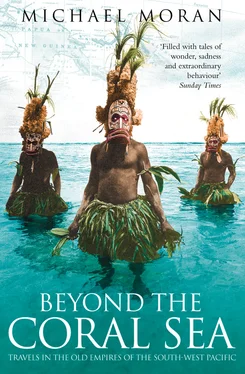‘Life was pretty primitive here in those early days, I suppose.’ I wanted to draw Poole out. He obliged me at length.
‘Simple pleasures as now, I reckon. The malarial swamp was filled in by the prisoners to make a cricket field. Local people were forbidden to wear shirts in case they spread disease. They believed “the fever” came from the miasma that rose from the stagnant water. Mal aria means bad air, I think. Samarai was a deathtrap. The cemetery was always full. In fact, the fatal swamp occupied the football pitch right in front of your guesthouse. Sheep were imported from Australia and used to graze there until they were needed for meat. The residents, I think there were about a hundred and twenty in the early part of the century, played tennis, cricket and the children went swimming. Simple pleasures as I said.’
‘Sounds idyllic.’
‘There was always the demon drink. That’s a story in itself. The first hotel was called The Golden Fleece. One large room and a veranda. It was built of palm with a thatched roof. No doors or windows. Guests were expected to bring their own sheets, knives, forks and plates and sleep on the floor. Drunks would stumble in at night in hobnailed boots and fall over each other cursing and swearing.’
‘But I thought Samarai was famous for the glamour of its hotels!’
‘True, but that was later in the 1920s. There were a couple of better hotels – the largest one had two storeys and was called The Cosmopolitan. Another called The Samarai, was at one time run by a real merry widow named Flora Gofton. Missionaries had to drag the drunks into church. One called “Cheers!” during the consecration.’ I had to smile at this.
‘And the hospital?’
‘Oh, they built two hospitals and two schools – one each for Europeans and Papuans. Water was segregated as well. “Pride of race”, they called it. On moonlit nights people would go around the island by launch singing. Everybody loved the place, although it was pretty wild with drunken miners and labour recruiters.’
‘Women must’ve had a pretty rough time.’
‘Some sad stories there. Many just upped sticks and left. There was a Swede named Nielsen who worked his butt off and made a few quid. Then he married a pretty Australian girl who was a bit footloose, you know the sort. She finally pissed off and went south. Every three weeks he would paddle his dinghy out through the mangroves to meet the steamer. Dreamed she would be on it. He always dressed up to the nines to meet her, immaculate – tan boots, clean shirt, tie and white duck trousers. She always disappointed him and never arrived. He would return to Samarai cursing all women and get drunk as a sponge that night.’
‘What about married women?’
‘Spent all their time looking after ill children. Helluva life. I’ve got part of a letter here somewhere that will give you an idea.’ He fished around in a hefty file by his armchair and extracted a dog-eared photocopy. I noticed he kept scratching his legs and bare arms as did most expatriates I met in Papua New Guinea.
‘This one was written by Nell Turner, married to an officer of some sort. It’s from The Residency, used to be up on the hill, dated January 1909. She writes: “Alf is not at all well tho’ he is gaining weight this last month … Kate is a lot bigger than mother – gets bigger and fatter after each baby. Mollie had convulsions on New Year Eve and took over two hours to come out of it, was quite stupid for a couple of days after, she seems quite recovered now. Munrowd had a fit a week after Mollie, but is well again. Jean had a dose of fever but is on the mend.”’
‘Sounds drastic to me. Matter of fact my own wife is in Australia at the moment. It’s tough for women here.’ He carefully placed the letter back into his archive. ‘I hope to write a history of Samarai one day. No time of course.’
I suggested we find Wallace, so we went over to the guesthouse. I called out but there was no reply. The large room was sparsely furnished and seedy, like an old people’s home. A meal was laid out on a table under white gauze. It was dim despite the fierce sun blazing down outside.
‘ Yu yah! kamap pinis! 1 I had gone down to the wharf to meet you!’
A voice came from the gloomy interior at the back of the house. A patriarchal Melanesian in an immaculate white shirt emerged from a corridor limping slightly. His grey hair was carefully groomed, teeth mauled by betel, warm eyes that expressed a mixture of love and disappointment. One of his hands had been amputated midway down the forearm.
‘Got your letter. I’m Wallace Andrew.’
Ian left us. Wallace immediately sat down at a bare table and began to play a game of patience with a limp deck of cards. It was as though he needed to erect a barrier to communication as a safeguard. Clearly he had spent years of his life playing this game in lonely isolation. The skill with which he shuffled the deck and deftly dealt and gathered the cards in with the stump of his arm fascinated me.
‘I’ve come to see Samarai and Kwato.’ I pulled up a worn chair.
‘Ah, it’s so beautiful there. We’ll go together, you and I, to Kwato. Many people used to come, but there are few visitors now.’ The cards flopped softly onto the table. He scarcely noticed if the game ‘came out’ and took even less interest. Time seemed to have come to a shuddering halt. I realized with alarm that nothing was actually going to happen in the next five minutes, the next hour, for the rest of the afternoon, for my entire life if I stayed on the island for long enough. My own arrival was the main event of the week. I needed to slow down to Melanesian time. It was quiet in that room and baking hot. The ceiling fan motors had probably burnt out long ago.
‘Dinah will show you up to your room. Then come down and have lunch,’ he suddenly said.
A petite village woman with a beautiful smile gestured for me to follow her up what was almost a grand staircase. The central carpet had long since disappeared, but the unpainted wooden strip in the centre was a ghostly reminder of some past attempt at luxury. We took the right flight of the staircase and passed through two bare rooms with flaking paint. Broken lampshades, mattresses and lumber lay abandoned on the floor in a corner. Her bare feet noiselessly brushed the cracked lino. A long veranda opened off a landing, but the bleached scaffolding hid any view. She pushed open the door to No. 8, a large room furnished with a double bed, a single bed, a dressing table, a wardrobe and a fan. It was clean and comfortable with screened windows against mosquitoes. French doors opened onto the veranda. I looked through the maze of planks over the former swamp to the few colonial buildings that had survived the destruction of the war.
‘You share the bathroom and toilet,’ she said in excellent English and showed me the most basic of conveniences. I noticed a sign in red letters under a sheet of discoloured plastic on the wall of the shower: ‘For hot water pull string.’
Dinah smiled again and disappeared. A corridor led out to what I thought was a rear entrance, but I found that the stairs had been removed and a twenty-foot drop into empty space yawned below. In a shed I could see a wrecked dinghy. I wandered back into the stifling room and sat on the bed. Glancing up I caught sight of my reflection in the glass. A crumpled traveller, sweating heavily, weighed down with notebooks and maps, wearing a sand-coloured colonial shirt, a planter panama and blue suede boots. Overdressed for the occasion I thought. I noticed there were no locks to the door of room No. 8 as I went down to lunch.
‘Where were you born, Wallace?’ I had poured myself some livid green cordial and was helping myself from a platter of reef fish and bananas.
Читать дальше












